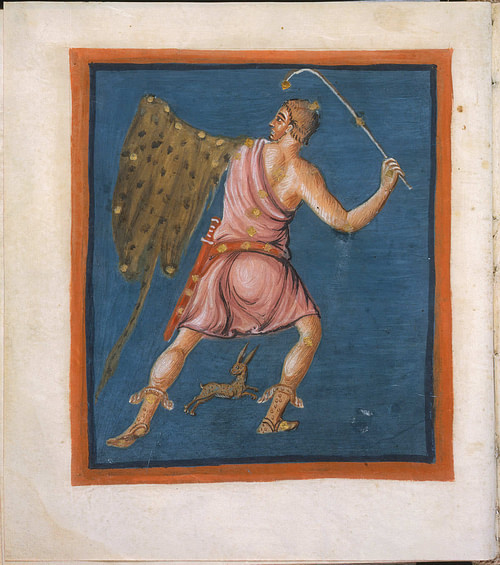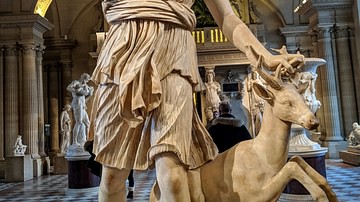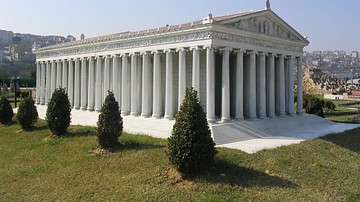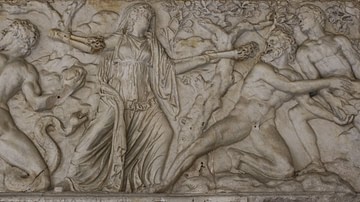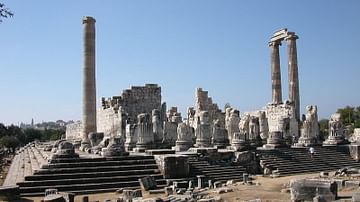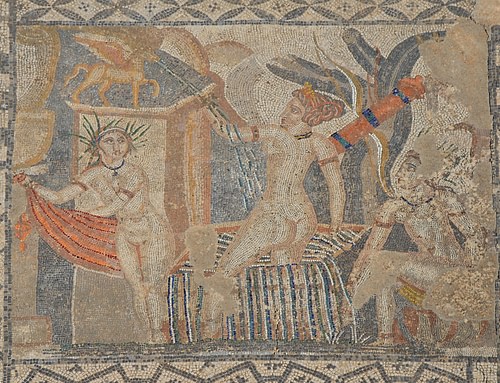
Diana was the goddess of childbirth, the fertility goddess, the goddess of the moon as well as the patron goddess of wild beasts in Roman mythology. However, she is best known as the goddess of the hunt, with her sacred animal being the deer. Her equivalent in Greek mythology is Artemis.
As with many of the myths surrounding the gods, both Roman and Greek mythology, those concerning Diana vary from source to source and often appear conflicting. Timelines and locations are frequently at odds. Often, a particular myth might be pieced together from a number of sources. Besides the classics of Greek literature, such as Homer and Hesiod, the best sources for Roman mythology are Ovid's Metamorphoses and Virgil's Aeneid. Through these works, Roman literature was able to provide a rich sense of tradition and history tied to a past replete with legends.
Birth & Family
Diana was the daughter of Jupiter and Latona (the Roman equivalent of Leto), the goddess of dark nights. Unfortunately, Latona incurred the wrath of a very jealous Juno. The wife of Jupiter was well aware of her husband's wandering eye. In a fit of temper, Juno banished the pregnant goddess to earth, declaring that no one, mortal or immortal, was to show her any pity. Driven by Juno's rage, she wandered the countryside tired and thirsty. Exhausted, she finally came to the seashore where she made an appeal for help to Neptune (Poseidon's Roman counterpart), god of the sea and Jupiter's brother. Hearing her plea and ignoring Juno's threat, he sent a dolphin to carry Latona to the island of Delos where she gave birth to Apollo and Diana.
The Greek poet Hesiod in his Theogony made a reference to the birth of the twins: "And Leto joined in love with Jupiter who holds the aegis and the offspring which she bore was lovelier than all the sons of heaven: Apollo and Artemis." (53) In another hymn Hesiod wrote of Artemis: "goddess with distaff of gold… for what is pleasing to her is the bow and to kill the beasts on the mountains…" (65)
Niobe & Orion
In most works of Roman art, Diana is depicted armed with a bow and quiver of arrows, and according to most accounts, her skill with the bow unquestionably equaled that of her twin brother Apollo. This skill can best be seen in the myths of Niobe and Orion.
One day the proud mother Latona casually boasted that her children excelled in beauty, intelligence, and power. Niobe, daughter of King Tantalus took exception to this boast. The conceited mother of 14 – seven boys and seven girls – taunted Latona for only having two children. In an act of spitefulness, Niobe forbade any of her subjects to worship either Apollo or Diana; she even destroyed their statues. Latona was enraged and told Apollo and Diana to kill all 14 of Niobe's children. Obeying their mother's wishes, Apollo killed the seven boys while Artemis killed the seven girls. Showing pity for the weeping Niobe, the gods turned her into a statue that was placed on Mount Sipylus where her children were slain.

In the Greek version of the myth, there is some variation. Niobe is the wife of the king of Thebes, Amphion, and she is furious because a festival, mostly for women, is being held in Thebes that celebrates Leto's two children by Zeus. Throughout the celebration, offerings are made to Leto at her temple. Of course, Niobe, being the mother of 14, has no honors bestowed on her. To irritate Leto, Niobe boasts that her children are more beautiful and powerful and asks her people to honor her, not Leto. To further annoy Leto, she plans to cancel next year's festival. However, for now, the nights are filled with hymns, but one night there are no hymns. Leto is in tears, and Apollo and Artemis swear to avenge the insult to their mother. The seven boys fall one by one to the arrows of Apollo. Even as her sons lay dead on the ground before her, Niobe brags that she is still better for she still has seven daughters. Hearing this, Artemis eliminates the seven girls, one in her mother's arms.
Endymion
Choosing never to marry, Diana received permission from her father to remain a virgin, joining Vesta and Minerva as the only virgin goddesses. One night as the goddess of the moon drove her milk-white horses across the sky, she spied the young, beautiful shepherd boy Endymion asleep on a hillside. Taken by his beauty, she stopped her chariot, bent down, and gave the young boy a kiss. Partially awakened, he briefly caught a glimpse of the goddess but believed it was only a dream. Night after night, Diana returned to the boy and gave him a kiss – a spell seemed to keep him from waking. Fearing that his beauty might be marred by toil and exposure, Diana caused him to fall into an eternal sleep. Taking him to a cave at Mount Latmus, she visited him every night.
Orion
In a second myth, Orion and his dog were hunting when they spied Diana's nymphs, the seven Pleiades (Atlas' daughters). As he approached them, they fled, but he followed. Eventually, exhausted, the nymphs could go no further and asked Diana for help. She turned them into pigeons. Flying away, they became a constellation.
Orion soon found love in Merope, the beautiful daughter of the king of Chios, but to marry her, he had to perform a heroic deed. Not willing to wait, Orion kidnapped her instead. He was caught; his punishment was blindness, he was forced to wander the earth alone and helpless. Hoping to find a cure, he finally came to the cave of the Cyclopes who felt pity for the blind youth. They took him to see the Sun whose radiance restored his sight. He returned to his hunting. It was while he was out hunting that he met Diana. Their mutual love of the hunt fostered a love affair, of which her brother did not approve. One night Apollo challenged his sister's ability with the bow. He told her to hit a small target far out in the sea. Diana, of course, hit it, but the target turned out to be Orion out for a nightly swim. In her grief, she turned Orion and Sirius into a constellation.
Actaeon
One of the best-known myths of Diana is that of Actaeon. After completing a long journey across the skies, the moon goddess and her nymphs would go on the hunt. One day they came across a mountain pool and decided to go for a swim. Meanwhile, Actaeon and his friends were hunting deer. In his Metamorphoses Ovid (43 BCE to 17 CE) relays the story: ... "the young Actaeon with friendly speech thus addressed his comrades of the chase as they fared through the trackless wastes." They come across a vale – the sacred haunt of Diana. It was while Diana and her nymphs were swimming that Actaeon happened to wander into the grotto. The nymphs tried to shield Diana. "... she stood aside a little and cast back her gaze and though she would of fain have had her arrows ready what she had she took up, the water, and flung it into the young man's face." He was now free to tell his friends what he had seen, but he could not: he grew the horns of a stag, his hands became feet and his arms were changed into legs. He tried to flee but the hounds buried "their fangs in his body till there was no place left for further wounds." (48-50)
The Trojan War
The Trojan War found Diana at odds with the Greeks. Agamemnon, the arrogant commander of the Greek forces, had insulted Diana, claiming to be a better hunter. Diana, angry at his impudence, stilled the waters, preventing the Greek ships from sailing. The soothsayer told Agamemnon that the only way to appease the gods was to sacrifice his eldest daughter Iphigenia. Realizing he had little choice he sent for his daughter, telling her she was to marry the Greek hero Achilles. Upon her arrival, she was immediately taken to the altar to be sacrificed, but Diana intervened, replacing her with a deer. She would become a priestess at Diana's temple. With the winds restored, the Greeks sailed to Troy.
Virgil's (70-19 BCE) Aeneid tells of the Trojan warrior Aeneas who, after the fall of Troy, escaped and sailed away initially landing at Carthage and then settling in Italy. A prophecy foretells that his descendants (Romulus and Remus) will establish the city of Rome. In their travels across the peninsula, Aeneas and his fellow Trojans arrive at the Tiber River and the kingdom of Latium. They end up in a war with them, initiated by Juno, and as the war progresses, an ally of Latium and leader of the Volscian forces, Camilla, is killed by Arruns. Diana is heartbroken, for Camilla was a favorite of hers. She tells one of her nymphs, Opis, of her affection for the fallen warrior:
Camilla goes forth to war and its savagery. She's dear to me, girl, beyond all others; and yet the weapons she's girding cannot save her… (276)
Diana tells of Camilla's father and his plea to the goddess to save his infant daughter. He tied her to his spear and prayed:
O kindly Diana the Virgin, patron of woodlands, I, her father, vow this child to your service. Yours the first weapon she holds to, a suppliant, fleeing the foe. I invoke you, O goddess – accept her for yours, whom now I commit to the chancy breezes. (276-277)
Diana added: "She was well-pleased to serve Diana alone, to remain a virgin forever, worshipping chastity and the chase." (277) To avenge Camilla's death Opis was sent to earth:
Take my bow and quiver: draw out an avenging arrow: with it, exact retribution in blood for me from the man who wounds and profanes her hallowed flesh. (277-278)
Conclusion
Like her brother Apollo, as well as others across the Roman pantheon, Diana survived the wrath of Jupiter's wife Juno. Never wanting to marry, she remained a virgin and became the goddess of the hunt, a powerful goddess with a bow and a quiver of arrows, the equal to her brother. Although she could, on occasion, show affection, she was more prone to display a darker side to her personality. She showed no mercy in eliminating the seven daughters of Niobe, Agamemnon's bravado cost him his daughter, and Actaeon saw the goddess as she swam only to lose his life to his own hounds. And when Camilla was killed, the goddess of the hunt sought revenge. Diana was a strong, powerful goddess, an equal (and in some ways greater) than any of the other gods and goddesses.

